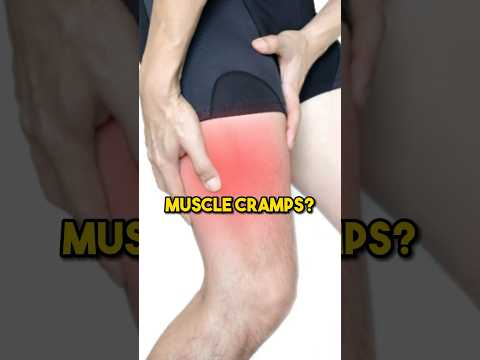
Hey there! So, you know those annoying leg cramps that sneak up on you when you’re trying to relax? Ugh, right? It’s like your muscles throw a surprise party, and you’re not invited!
Well, let me tell you about this little hero—magnesium. Yep, that mineral might just be the key to kicking those cramps to the curb. It’s not some hidden treasure; it’s right there in your food and supplements.
Imagine being able to break free from those midnight muscle spasms. Sounds dreamy, huh? Let’s dive into how magnesium can help you wave goodbye to those pesky leg cramps for good! You ready? Let’s go!
Understanding the Timeframe: How Long Does Magnesium Take to Relieve Leg Cramps?
Hey there! So, let’s chat about magnesium and its role in leg cramps. If you’ve ever woken up in the middle of the night with your leg feeling like it’s being squeezed in a vice, you know how annoying that can be. Magnesium might be your new best friend when it comes to easing those pesky cramps.
First off, what is magnesium? Well, it’s a mineral that’s super important for our bodies. It helps with muscle function, nerve signaling, and basically keeping everything running smoothly. When you’re low on magnesium, you might find yourself dealing with cramping more often.
Now to the big question: How long does it take for magnesium to actually help with those cramps? The timeline can vary depending on a few factors:
- Your current magnesium levels: If you’re really low, it might take a bit longer to see results.
- The form of magnesium: Some forms are absorbed better than others. Magnesium citrate is often recommended for quicker relief.
- Your overall health: Things like diet and hydration can play a part in how quickly magnesium works.
Generally speaking, some people may feel relief within a few hours after taking magnesium supplements. Others might notice improvements over days or weeks as their body adjusts. It’s kind of like how some plants perk up after watering right away while others take their time soaking it all in!
But here’s an important reminder: This info doesn’t replace professional healthcare! If leg cramps are bothering you regularly or if you’re thinking about adding supplements to your routine, chatting with a healthcare provider is definitely the way to go.
So there you have it! Magnesium could be your secret weapon against leg cramps—but remember that patience is key! You got this!
Top Magnesium Supplements for Effective Relief from Leg Cramps
Leg cramps, ugh! We’ve all been there, right? You’re cozy in bed, dreaming away, when suddenly—bam! A cramp hits like a lightning bolt. Not fun. One of the ways people try to tackle these pesky little monsters is by looking into magnesium supplements. So, let’s chat about it!
First off, magnesium plays a big role in muscle function. It helps muscles relax and keeps them from going all spastic on you. When you’re low on magnesium, those cramps can sneak up on you more often than you’d like. That’s why a lotta folks think about getting some extra magnesium in their lives.
Now, not all magnesium supplements are created equal. Here are some types that might help with leg cramps:
- Magnesium Citrate: This one’s pretty popular because it’s easily absorbed by the body. If you’re looking for something that works quickly, this could be your jam.
- Magnesium Glycinate: Super gentle on the stomach! It’s also known for promoting relaxation and might just help you snooze better at night.
- Magnesium Oxide: This one has a higher amount of magnesium per dose but isn’t absorbed as well as some others. Still worth considering if you want to increase your overall intake.
- Magnesium Malate: It’s believed to be more energizing and is suggested for people dealing with fatigue alongside cramps.
Here’s the thing: while supplements can help increase your magnesium levels, they definitely shouldn’t replace a balanced diet rich in magnesium-containing foods like nuts, seeds, whole grains, and leafy greens.
And remember my friend Mary? She started taking a Magnesium Citrate supplement when those nighttime cramps became too much to handle. After a few weeks of consistently using it (and eating more spinach), she noticed fewer interruptions to her beauty sleep!
But hey, before diving into any supplement routine—especially if you have health conditions or take other medications—chatting with a healthcare provider is always smart!
So yeah, while you’re trying out different things for leg cramp relief, maybe give those magnesium supplements a thought. Just remember that they’re part of the picture—not the whole canvas!
Identifying Nutrient Deficiencies: What Your Body Lacks When Experiencing Leg Cramps
Leg cramps can be such a nuisance, right? I mean, one minute you’re cozy in bed, and the next, your leg is acting like it’s auditioning for a contortionist. But hey, they can also be little red flags telling you something’s up with your body. So let’s dive into what might be causing those cramps and what nutrients could be lacking.
First off, magnesium seems to steal the show here. This mineral plays a crucial role in muscle relaxation. If you’re not getting enough of it from your diet, you might find yourself waking up with those pesky cramps. It’s found in foods like nuts, seeds, and leafy greens. Seriously, if you haven’t tried sneaking some spinach into your meals—give it a whirl!
Another player in this game is potassium. This mineral helps with nerve signaling and muscle function. Think bananas! You’ve heard that before, right? But don’t limit yourself to just one fruit; potatoes and avocados are great too.
And we can’t forget calcium. It’s often known for strong bones but it’s also super important for muscles to contract properly. If your calcium levels are low, that’s another strike against cramp-free living.
Then we have vitamin D, which helps the body absorb calcium. If you’re not catching enough sunshine or eating fortified foods like milk or cereals, that could be an issue too.
Lastly, dehydration! It sounds simple but it’s often overlooked. When you’re not drinking enough water or sweating too much without replacing fluids, guess what? Your muscles can start to rebel!
So if leg cramps are becoming your nightly companion:
- Check if you’re getting enough magnesium.
- Load up on potassium-rich foods.
- Don’t skimp on calcium.
- Make sure your vitamin D levels are good.
- Stay hydrated!
Remember each body is unique! What works for one person may not work for another. And always consider talking to a pro if something feels seriously off! Stay curious about what makes your body tick—your legs will thank you later!
Effective Strategies to Relieve Leg Cramps Instantly
So, let’s talk about those annoying leg cramps. You know, the ones that hit you right when you’re trying to sleep or during that peaceful evening walk? They can be a total buzzkill! But guess what? There are some strategies you can try to relieve them almost instantly. Seriously, you don’t have to suffer through those painful moments anymore.
First off, let’s chat about magnesium. This mineral does wonders for muscle relaxation. So if you’re often feeling like a pretzel with your legs all twisted up, maybe it’s time to check if you’re getting enough magnesium in your diet. Foods like nuts, seeds, and leafy greens are great sources. Just a little tweak in your meals might help keep those cramps at bay!
Now, when a cramp strikes, one quick fix is to stretch it out. Gently pull your toes towards you while keeping your leg straight. It sounds simple, but this move can help release the tension built up in the muscle.
Another nifty trick is to apply heat directly to the area that’s cramping. A warm towel or heating pad can feel super soothing. Just imagine relaxing on the couch while that heat melts away the tension—heavenly!
Also, don’t overlook the power of staying hydrated. Dehydration can sometimes be a sneaky culprit behind those cramps. Make sure you’re drinking enough water throughout the day. It’s an easy fix that makes a big difference!
And hey, sometimes just moving around can work wonders too! Standing up and gently walking it off can help get that blood flowing again.
Oh! And one last thing—if you happen to have some ice nearby after a workout or activity and feel a cramp coming on, using ice for 15-20 minutes might also give some relief.
So remember: magnesium-rich foods, stretching, heat application, staying hydrated, and moving around are all strategies that could help ease those pesky cramps when they decide to crash your party. But always keep in mind that if cramps happen too often or feel super intense, chatting with a healthcare professional is always a smart move!
You know those nights when you’re just about to drift off into a cozy sleep, and suddenly—wham!—a leg cramp hits you like a brick? Ugh, it’s the worst. I remember one time I was at a friend’s wedding, dancing my heart out. Everything was going great until I felt that all-too-familiar tightening in my calf. Talk about an embarrassing moment! I had to excuse myself while trying not to yelp or make too much of a scene.
So, leg cramps can be really annoying, right? They usually strike when you least expect them. A lot of folks wonder why they even happen. Well, one common reason is a lack of certain nutrients in our diets—like magnesium. Yup! This little mineral plays some serious magic tricks when it comes to muscle function.
Magnesium helps your muscles relax and contract properly. So if you’re low on it, those cramps can show up like an uninvited guest at your party. But here’s the kicker: many people don’t even realize they’re not getting enough magnesium!
You could find magnesium in foods like nuts, whole grains, leafy greens, and dark chocolate (yes!). But if you think about how busy life gets, sometimes it’s tough to get all the good stuff we need through food alone. That’s where supplements come into play for some people.
You might ask yourself how much magnesium you actually need each day—it really depends on your age and sex. For adults, it’s usually around 310-420 mg daily but hey—it’s always smart to chat with a health professional before adding anything new to your routine.
And let me tell you something else—it’s not just about tackling cramps; magnesium has other cool benefits too! It helps with sleep quality and may even boost mood. Who doesn’t want that?
Getting enough magnesium might just be the answer to keeping those late-night leg cramps away for good. And while I can’t promise you’ll dance the night away without any issues ever again (sorry!), focusing on what goes into your body might just make those sleepless nights a thing of the past.
Anyway, next time you feel that twinge in your leg, take a moment to think about what you’ve been eating—and maybe grab some almonds or spinach for dinner! You never know; it could work wonders for you. Just remember: nothing beats professional advice when it comes to health stuff! So keep talking with your doc or nutritionist about what works best for you—and here’s hoping those pesky leg cramps become just a distant memory!
